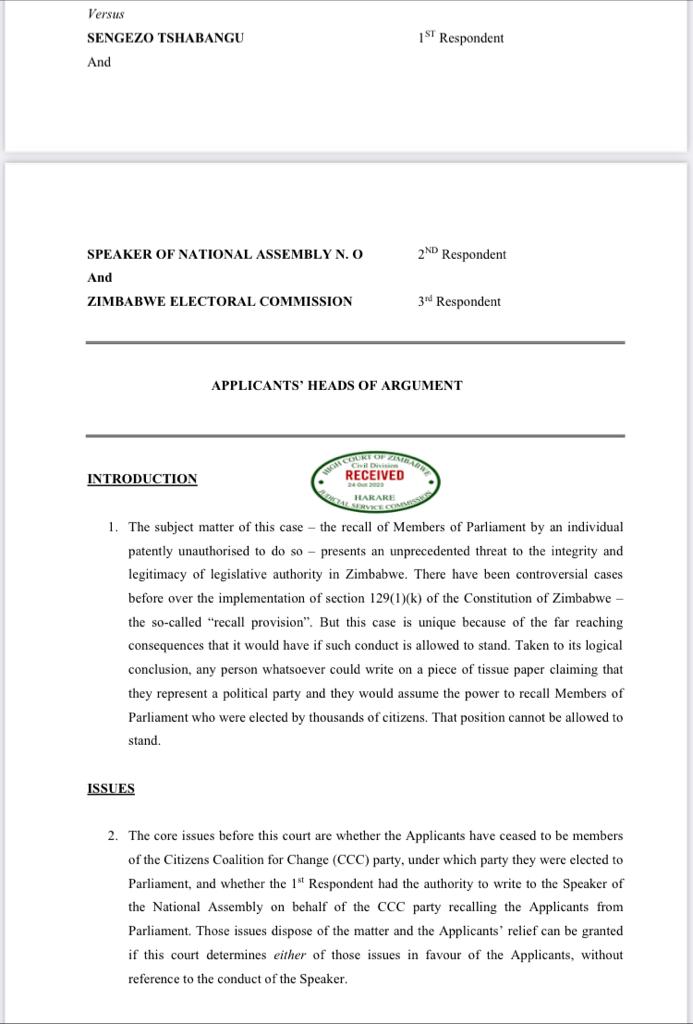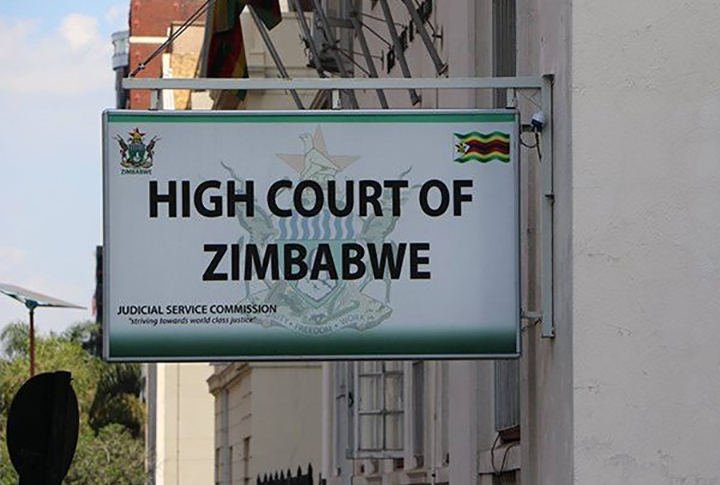The recalled Citizens Coalition for Change (CCC) Members of Parliament have filed their Heads of Argument at the Harare High Court, arguing that Sengezo Tshabangu has not presented any evidence to show they ceased to be members of the CCC party because they were elected under CCC.
The MPs also argue their disagreement with the Speaker of the National Assembly, Jacob Mudenda, was him acting on a letter whose authenticity he did not verify, stating the recalls pose an unprecedented threat to the legislative authority in Zimbabwe, as anyone could write on a piece of “tissue” paper claiming to represent a political party and recall MPs “elected by thousands.”
In their Heads of Argument filed on October 24, 2023, the 14 applicants argue while there have been previous controversial cases over the implementation of Section 129(1)(k) of the Zimbabwean Constitution, known as the “recall provision,” their case is unique because of the far-reaching consequences if such conduct is allowed to stand.

“Taken to its logical conclusion, any person whatsoever could write on a piece of tissue paper claiming that they represent a political party and they would assume the power to recall Members of Parliament who were elected by who were elected by thousands of citizens. That position cannot be allowed to stand,” said the recalled MPs.
The applicants stated they had presented “positive” evidence to the court to establish they are still members of CCC, especially a letter from the party’s leader, Nelson Chamisa, whilst Tshabangu has not shown any evidence to show they were not.
They stated they have no clue on what basis Tshabangu claims they have ceased to be CCC members, or by what process, and that it is his responsibility to inform the court of this.
“He failed to do so, meaning that they averment that they have not ceased to be members of the CCC party must stand. Secondly, Mr Tshabangu has not placed any evidence before the court whatsoever to prove that he is, in fact, the ‘interim Secretary General’ of the CCC party, or that such a position even exists. He has not even attempted to explain how or when he was appointed or elected as ‘interim Secretary General,’”, said the MPs.
“His failure to do so is fatal to his case.”
The core issues before the court, according to the recalled MPs are whether they have ceased to be members of the CCC, a party they were elected to Parliament, and whether Tshabangu, cited as the first respondent, had the authority to write to the Speaker on behalf of CCC recalling them.
The MPs go on to describe the Speaker’s actions as “shocking” and having “catastrophic consequences” for Zimbabwe’s constitutional order, which they say demands a determination of a further legal question of whether Mudenda should have proceeded to notify the Zimbabwe Electoral Commission (ZEC) of the purported vacancies “when he was aware that the letter on which he was relying on was patently fraudulent, was not from the political party in question, and that, in fact, no vacancy had arisen.”
The MPs state their case as essentially this:
“a. They have not ceased to be members of the CCC party; and b. Mr Tshabangu did not have authority to write the recall letter on behalf of the CCC party and did not represent the CCC party.”
The MPs also aver Tshabangu did not refute these two points and apart from bare denials of the allegations, he provides no evidence “whatsoever” to back up his claims.
“Neither of the conditions precedent for the operation of Section 129(1)(k) had been met when the applicants were recalled,” argued the expelled MPs.
The applicants further argue the Speaker must only act on a recall letter he receives if, in fact, a vacancy has arisen.
“Where the Speaker is aware, as in the present case, that no such vacancy has arisen – because the ‘recall letter’ that he received is, in fact, NOT a written notice from the political party concerned – he cannot lawfully act on that letter to notify ZEC and the President,” argued the MPs.
The MPs explained their issue “distinguishable from a situation where the Speaker is asked to delve into the legality of an individual’s expulsion from a political party and subsequent recall from Parliament.”
“That is not the issue in this case,” said the MPs, “Rather it is an issue of the authenticity of the letter and whether in fact it originated from, and was written on behalf of, the Applicant’s political party. Clearly, it was not written on behalf of the political party concerned.”
Further, the recalled MPs, claimed it was an “undisputed fact” that the Speaker was advised by the CCC party through Chamisa, that no other official could communicate with Parliament on behalf of the party and that the letter from Tshabangu was “clearly fraudulent ex facie.”
“It therefore follows that the Speaker was fully aware that, in fact, no vacancy had arisen in the National Assembly. Therefore, the Speaker ought not to have written to the President and ZEC falsely advising them that a vacancy had arisen in Parliament, when in fact it had not.”
The Applicants seek a declarator that their recall from Parliament was illegal and consequential interdictory relief.


Zanu PF a criminal organisation